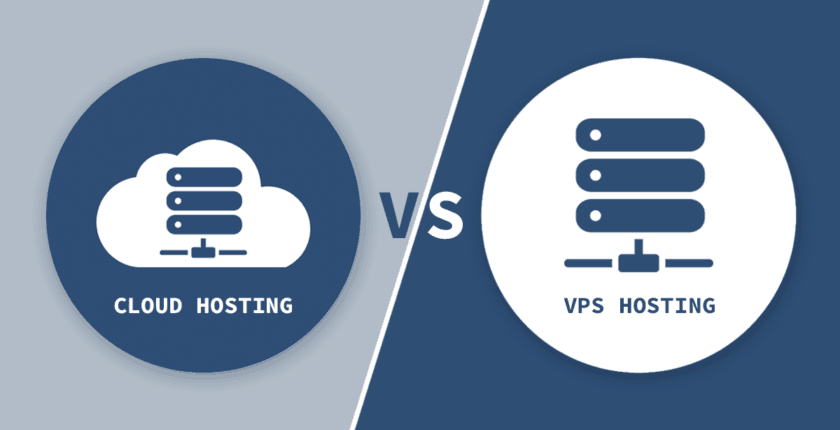
A cloud is a collection of potentially an infinite number of devices that are connected via a network and function as if they are one. The virtual machines all access the same data, which is kept on various networked servers that are linked together to form a single data storage center. You’ll get a whole network of connected servers as well as data storage.
A virtual private server is a portion of a dedicated server computer. It appears to be an independent server, but it’s actually a self-contained folder on a strong physical host machine that also hosts virtual servers for other clients. Although you share physical space on the host, your virtual server is separate from the others. It is possible to reboot a VPS without affecting the other VPSs on the machine.
You have root access to the server operating system (OS), and you can install applications just like you would on a dedicated hosting plan with your own server. Your VPS receives a piece of the actual host’s CPU and RAM, but you also share additional resources with the other virtual servers.
Customization
With cloud hosting, you may customize network architecture, firewalls, load balancing, and IP addresses, among other things. The requirement to disperse functionality across multiple servers, on the other hand, may result in a loss of control over specific hosting settings. Both Windows and Linux clouds are widely available, so you can choose your preferred operating system. Because a cloud environment is more complex, configuring it may necessitate more technical knowledge, especially if you want to take full advantage of the cloud network.
VPS hosting allows you a lot of customization, just like a dedicated server. You have total root access and control over the operating system, as well as the website and all software. As if you had a separate server, you may personalize and configure it as you choose. Because each physical host system can only run one operating system, if the hosting business only offers one sort of virtual hosting machine, your OS options may be limited. For this form of hosting, Linux systems are more frequent than Windows systems.
Scalability
Cloud hosting is far more scalable, allowing for real-time capacity expansion. The amount of data that can be stored is practically limitless. When your website’s traffic spikes, a full network of servers and data storage servers is ready to be tapped. The most significant benefit of cloud hosting Page 1 of 2 services is the near-constant availability of processing power.
Scalability of VPS hosting is limited by the physical host computer. You have access to more memory and CPU power beyond that allocated to your virtual machine, but the physical host has a limit on what it can provide. If you require additional resources, you will need to purchase a new plan and may experience downtime while transitioning to a new solution.
Performance
Because of the various servers in a redundant system, cloud hosting ensures excellent availability and uptime. If a server fails, its files and functional duties are automatically transferred to another server with no downtime. Memory and CPU power can be increased or decreased on demand to meet your needs or to compensate for those of another client without affecting other network users. It’s perfect for sites with a lot of traffic that fluctuates a lot.
Because a set amount of system resources is committed to your virtual server, VPS hosting ensures a consistent level of performance. However, if you and another virtual server on the same physical host both need the extra resources at the same time, or if your server requires more than the physical host can offer, heavy demand by your server or another virtual server on the same physical host may have an impact on performance.
A VPS can also be a single point of failure since if the actual host server fails, so do all of the VPSs on that system. VPS hosting can be adapted to a cloud network, and some companies offer failover to alternate servers as part of their contracts.
Security
Cloud hosting has a high level of security. As with a VPS, your server is totally isolated from other clients. However, because the infrastructure is web-based, it may be more vulnerable to attacks because it is physically distributed and hence more difficult to safeguard. Furthermore, because the data is spread across multiple locations, it may be impossible to comply with some data security laws.
VPS hosting offers security that is nearly identical to that of a dedicated physical server. The VPS operates independently of any other VPS on the same physical host, as if it were a different machine, however inadequate security measures made by one VPS’s owner may have an impact on others on the same physical server. However, compared to shared hosting, this is a lot less frequent scenario. The physical host’s centralized location adds security to activities with sensitive data whose location must be known and controlled in order to comply with data security standards.
Cost
Because you’re paying for a lot of hardware, extensive networking, and the resulting uptime guarantee, cloud hosting is more expensive than a VPS. Because you only pay for what you use with these plans, expenses may be unpredictable due to unanticipated traffic surges. Consider it in the same way as you would your utility payment. Sure, there’s plenty of electricity when you need it, but your bill will go up at the end of the month.
VPS hosting is usually less expensive than a cloud server and saves money over a dedicated physical server. Because of the guaranteed server resources and limited scalability, the monthly cost is predictable. The cost of hosting will be determined in part by the management and support options that come with it.
Do you Prefer Cloud Hosting or VPS Hosting?
We’ve provided you enough pointers to help you navigate the maze of hosting options. With this information, you can confidently ask the proper questions and take the right turn toward your goals at every step. What kind of hosting power do you need? In general, VPS hosting is a more expensive but more capable option for enterprises that are steadily growing. For the more hesitant site owner who isn’t sure how many resources they’ll need in the long run, cloud hosting offers a more economical choice with wildly different degrees of scalability.

